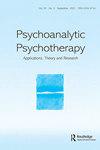Low SES is an introject: commentary on socioeconomic dynamics in an American psychoanalytic psychotherapy training clinic: an exploratory qualitative analysis of doctoral education and practice
IF 1.2
Q1 PSYCHOLOGY, PSYCHOANALYSIS
引用次数: 0
Abstract
The purpose of this brief commentary is twofold: First, to highlight the kind of articles we, as editors, would like to publish in the journal. Second, to raise the bar with respect to the methodological sophistication of these articles. Specifically, John Garrett Tanner’s article touches upon a supremely important issue: Low socio-economic Status (SES) and its role within psychotherapy practice and training. In its most extreme form, low SES amounts to poverty. From a global health perspective, poverty, particularly abject poverty, is akin to a weapon of mass destruction. Its formidable effects infiltrate into all contexts, including that of the intimate, scared, arena of the therapeutic relationship. Tanner’s article focuses on the impact of low SES on therapeutic relationships from the eyes of doctoral-level psychotherapists in training, thereby bringing societal plights (back) into the clinic. Faithful to the Journal’s scope, we are interested in articles such as this which address applied psychoanalytic practice in the public sector. That Tanner’s article utilizes qualitative data analyses is also highly consistent with the methodological pluralism we wish to advance in the Journal. At the same time, we wish to address some methodological limitations of Tanner’s article in order to set the stage for an increased methodological rigor of the articles published in this journal, whether they are qualitative, quantitative, or clinical-theoretical. Finally, we reflect on the article’s findings by situating it within the context of psychoanalytic object-relations and intersubjectivity theories低社会经济地位是对美国精神分析心理治疗培训诊所社会经济动态的反思:对博士教育和实践的探索性定性分析
这篇简短评论的目的有两个:首先,强调我们作为编辑希望在期刊上发表的文章类型。第二,提高这些条款在方法上的复杂性。具体来说,约翰·加勒特·坦纳的文章触及了一个极其重要的问题:低社会经济地位(SES)及其在心理治疗实践和培训中的作用。在最极端的形式中,低社会经济地位相当于贫困。从全球卫生角度来看,贫困,特别是赤贫,类似于大规模毁灭性武器。它的强大影响渗透到所有的环境中,包括亲密、恐惧、治疗关系的舞台。Tanner的文章从接受培训的博士级心理治疗师的角度,重点关注低社会经济地位对治疗关系的影响,从而将社会困境(带回)临床。忠实于《华尔街日报》的范围,我们对这类文章感兴趣,这些文章涉及公共部门的应用精神分析实践。Tanner的文章利用了定性数据分析,这也与我们希望在《华尔街日报》上提出的方法论多元主义高度一致。同时,我们希望解决Tanner文章的一些方法学局限性,以便为本杂志上发表的文章的方法学严谨性奠定基础,无论这些文章是定性的、定量的还是临床理论的。最后,我们将这篇文章置于精神分析客体关系和主体间性理论的背景下,反思这篇文章的发现
本文章由计算机程序翻译,如有差异,请以英文原文为准。
求助全文
约1分钟内获得全文
求助全文
来源期刊

Psychoanalytic Psychotherapy
PSYCHOLOGY, PSYCHOANALYSIS-
CiteScore
1.30
自引率
37.50%
发文量
22
期刊介绍:
Psychoanalytic Psychotherapy publishes original contributions on the application, development and evaluation of psychoanalytic ideas and therapeutic interventions in the public health sector and other related applied settings. The Journal aims to promote theoretical and applied developments that are underpinned by a psychoanalytic understanding of the mind. Its aims are consonant with those of the Association for Psychoanalytic Psychotherapy in the NHS (APP in the NHS) in promoting applied psychoanalytic work and thinking in the health care system, across the whole age range.
 求助内容:
求助内容: 应助结果提醒方式:
应助结果提醒方式:


